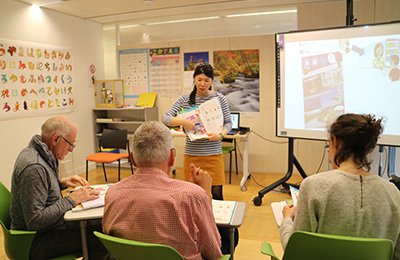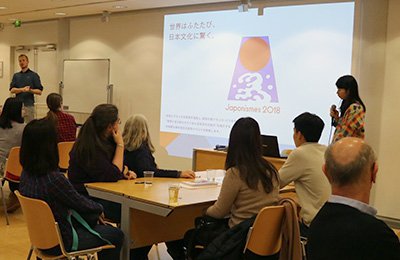2019 Japanese-Language Assistants’ Report: "Learning Spaces" Created by the Japanese Language
The Japan Cultural Institute in Paris
INOUE Miyu
From June 2018 to February 2019, a major cultural and artistic event called “Japonismes 2018” took place around Paris, France. I was dispatched to the Japan Cultural Institute in Paris (hereafter referred to as "the Institute") as a Japanese-Language Assistant (hereafter referred to as "Assistant") in June 2018, when Paris began to well up with Japanese culture over the eight months the event took place, attracting three million people. The Institute faces the Seine River, and from the upper floors of the glass-walled building, you can enjoy a 180-degree view of the four seasons in Paris. The Assistant belongs to the Institute's Japanese language department, which is the center of Japanese culture in France, and their duties range from support for training to teaching Japanese-language courses at the Institute. During my first year at the Institute, I have been involved in creating a variety of "learning spaces" through Japanese language education. Here, I would like to discuss the creation of "learning spaces" in which the Assistant is particularly involved.
Japanese Language Learners - Japanese Language
The Institute holds Japanese-language courses that use the textbook "Marugoto: Japanese Language and Culture." The Assistant teaches two or three 90-minute classes a week. The majority of the students are adult learners, and most of them are studying as a hobby. My role here is to create a "learning space" that connects students with the Japanese language. Rather than the teacher speaking to the learners unilaterally, I try to make the class a place where learners can speak up without fear of failure, exchange opinions with each other, and teach each other. After each class, I reflect on what went well and what didn't go so well, and use those insights to improve the next class.

An Assistant instructs an elementary 2A2 class.
Person - Person
Every three months, we hold an exchange gathering called "Shaberon" for students of our courses to interact with Japanese people who live in Paris. The Assistant is in charge of planning and organizing this event. Participants are divided into groups of four or five people and enjoy free conversation for about two hours. At times, we also set a specific theme to talk about, such as the "Japonismes 2018 Shaberon." I feel rewarded when I see students exchanging contact information or talking happily in Japanese after an exchange gathering. It is a good opportunity for students who are studying Japanese but do not have much contact with Japanese people to talk in Japanese. Furthermore, the program is also well received by the Japanese participants, some of whom attend every time. This exchange gathering is a learning opportunity to connect people with people, and it is a very valuable opportunity, not only to practice language, but also to learn things about each other's culture and lifestyle that are not covered in textbooks.

The exchange gathering "Shaberon" discusses Japonismes 2018.
Teacher - Teacher
The Assistant also works with the Japanese-Language Senior Specialist from the planning stage to implementation of the workshops that serve as "learning spaces for educators," which include the Japanese language department's three major projects, such as the "Japanese Language Training Program for Secondary Schools in France" and the "Japanese Language Education Workshop in Europe." The main task of the Assistant for these events is to prepare the details of the training. Preparations for implementing a single event begin four to five months in advance, and the Assistant takes care of many background tasks, such as communicating with participants, preparing materials, preparing the venue and arranging equipment. However, being in charge of such tasks is a great learning experience, as I can learn alongside the Japanese-Language Senior Specialist the entire process from the time of planning the training to follow-up after the training. On the day of the training, I am able to meet teachers who are active in France and Europe and who are full of energy, which always inspires me to work hard.
Japanese Language Education - Me
When I first entered the field of Japanese language education in 2014, I had a narrow perspective and thought that teaching the Japanese language was the only way to educate students about Japanese language. The wide-ranging "learning spaces" at the Institute taught me the breadth of Japanese language education. In the future, I would like to continue my professional studies in Japanese language education, but now that I know that it is possible to be involved in Japanese language education in various ways, I would like to expand my insight into the further possibilities of Japanese language education and create "learning spaces" in various Japanese language education sites.
- What We Do Top
- Arts and Cultural Exchange [Culture]
- Japanese-Language Education Overseas [Language]
- Japanese-Language Education Overseas [Language] Top
- Learn Japanese-language
- Teach Japanese-language
- Take Japanese-Language Test
- Know about Japanese-language education abroad
- The Japanese-Language Institute, Urawa
- The Japanese-Language Institute, Kansai
- Japanese-Language Programs for Foreign Specified Skilled Worker Candidates
- Japanese Language Education for Japanese Children Resident Overseas and for the Descendants of Migrants
- Archives
- Japanese Studies and Global Partnerships [Dialogue]
- JF digital collection
- Other Programs / Programs to Commemorate Exchange Year
- Awards and Prizes
- Publications
